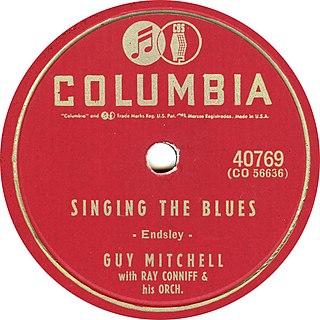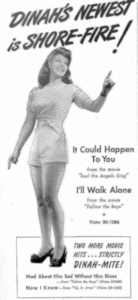Related Research Articles

"Singing the Blues" is a popular song composed by Melvin Endsley and published in 1956. The highest-charting version was by Guy Mitchell and the first recording of the song was by Marty Robbins. It is not related to the 1920 jazz song "Singin' the Blues" recorded by Frank Trumbauer and Bix Beiderbecke in 1927.
"Have I Told You Lately That I Love You?" is a popular song written by Scotty Wiseman for the 1944 musical film, Sing, Neighbor, Sing and performed by Lulu Belle and Scotty. It was their greatest hit and one of the first country music songs to attract major attention in the pop music field. Although the song was featured in the movie, it was not released by Lulu Belle and Scotty until 1947. The first released version of this song was by Gene Autry in 1945.

"Once a Day" is a song written by Bill Anderson and recorded as the debut single by American country artist Connie Smith. It was produced by Bob Ferguson for her self-titled debut album. The song was released in August 1964, topping the Billboard country music chart for eight weeks between late 1964 and early 1965. It was the first debut single by a female artist to reach number one on the Billboard Hot Country Songs. This song peaked at number one for the week of November 28, 1964, and it stayed at number one for eight consecutive weeks, a record for a female solo artist for nearly 50 years, until it was surpassed by Taylor Swift's "We Are Never Ever Getting Back Together" in December 2012.

"I'll Walk Alone" is a 1944 popular song with music by Jule Styne and lyrics by Sammy Cahn. The song was written for the 1944 musical film Follow the Boys, in which it was sung by Dinah Shore, and was nominated for the Academy Award for Best Original Song but lost to “Swinging on a Star”. Shore recorded the song in March as a single, which became her first #1 hit on the Billboard charts.

"A White Sport Coat (And A Pink Carnation)" is a 1957 country and western song with words and music both written by Marty Robbins. It was recorded at the Bradley Studios in Nashville, Tennessee on January 25, 1957, and released on the Columbia Records label on March 4. The arranger and recording session conductor was Ray Conniff, an in-house conductor/arranger at Columbia. Robbins had demanded to have Conniff oversee the recording after his earlier hit, "Singing the Blues", had been quickly eclipsed on the charts by Guy Mitchell's cover version, which was scored and conducted by Conniff in October 1956.

The discography of American country music singer Marty Robbins consists of 52 studio albums, 13 compilation albums, and 100 singles. In his career, Robbins has charted 17 Number One singles on the Billboard Hot Country Songs charts, as well as 82 Top 40 singles.
"You Gave Me a Mountain" is a song written by country singer-songwriter Marty Robbins during the 1960s. It has been recorded by many artists, including Robbins himself, but the highest-charting version of the song was by Frankie Laine in 1969. This version was included on Laine's album of the same name.
"Ruby Ann" is a song written by Lee Emerson, Rashima Bellamy and Roberta Bellamy, and recorded by American country music artist Marty Robbins. It was released in October 1962. "Ruby Ann" was the number one country follow-up to "Devil Woman." "Ruby Ann" spent a single week at number one and crossed over to the pop chart peaking at number eighteen. On the Easy Listening chart "Ruby Ann" went to number four.
"Bouquet of Roses" is a 1948 song written by Steve Nelson (music) and Bob Hilliard (lyrics). It was originally recorded by Eddy Arnold and his Tennessee Plow Boys and his Guitar in Chicago on May 18, 1947. It was released by RCA Victor as catalogue number 20-2806 and by EMI on the His Master's Voice label as catalogue numbers BD 1234 and IM 1399. "Bouquet of Roses" was Eddy Arnold's third number one in a row on the Juke Box Folk Record chart and spent 19 weeks on the Best Selling Folk Records chart. In 1949, when RCA Victor introduced its new 45 RPM single format this record was among seven initial releases and the first in the Country and Western category. Arnold would re-record "Bouquet of Roses" several times during his career.
"Ribbon of Darkness" is a song written by Gordon Lightfoot that was released in 1965 as a single by Marty Robbins. The song was Robbins' eleventh number one on the U.S. country singles chart, where it spent one week at the top and a total of nineteen weeks on the chart.
"I Walk Alone" is a song written by Herbert Wilson. and recorded by American country music artist, Eddy Arnold and was the B-side of his 78 rpm single "Did You See My Daddy Over There" (1945), and later for his compilation album Eddy Arnold Sings Them Again (1960).
"My Woman, My Woman, My Wife" is a song written and recorded by American country music artist Marty Robbins. It was released in January 1970 as the first single and title track from the album My Woman, My Woman, My Wife. The song was Robbins' 14th number one on the country chart. The single spent a single week at number one and spent a total of 15 weeks on the country charts. The song won the Grammy Award for Best Country Song in 1971.
"El Paso City" is a song written and recorded by American country music artist Marty Robbins. It was released in March 1976 as the first single and title track from the album El Paso City. The song was Robbins' 15th number one on the U.S. country singles chart and his first since "My Woman, My Woman, My Wife" six years earlier. The single stayed at number one for two weeks and spent 11 weeks on the chart.

"Big Iron" is a country ballad song written and performed by Marty Robbins. Originally released as an album track on Gunfighter Ballads and Trail Songs in September 1959, it was released as a single in February 1960 with the song "Saddle Tramp" as the B-side single. In 2010, members of the Western Writers of America chose it as the 11th best Western song of all time.

"Are You Sincere" is a song written by Wayne Walker, originally released in 1957. Andy Williams recorded the song, which Cadence Records issued as a single in 1958, with an orchestra conducted by Archie Bleyer. Since Williams' success, the song has been covered many times in pop and country styles. Notable covers include versions by: The Platters (1959), Eddy Arnold (1961), Gene McDaniels (1961), Marty Robbins (1961), Lenny Welch (1963), Trini Lopez (1965), Ray Anthony (1968), Bobby Vinton (1969), Brook Benton (1970), Jean Shepard (1973), Elvis Presley (1973), Mel Tillis (1979), Charley Pride (1986),
Melvin Endsley was a musician, singer, and songwriter best known for writing the song "Singing the Blues", along with over 400 songs recorded by hundreds of artists since 1956. Some of the artists that have recorded his songs include Johnny Cash, Marty Robbins, Andy Williams, Paul McCartney, Stonewall Jackson, and Ricky Skaggs. At the beginning of his career, Endsley recorded including RCA and MGM, however, his vocal recordings were commercially unsuccessful. In 1998, he was inducted into the Arkansas Entertainers Hall of Fame.
"Return to Me" is a song with music by Carmen Lombardo and lyrics by Danny Di Minno. The song was released in 1958 by Dean Martin. Martin recorded the song again in 1961 for his album Dino: Italian Love Songs.

My Woman, My Woman, My Wife is a studio album by country music singer Marty Robbins. It was released in 1970 by Columbia Records.

The Drifter is a studio album by country music singer Marty Robbins. It was released in 1966 by Columbia Records.

Send Me the Pillow You Dream On and Other Great Country Hits is a studio album by American country singer–songwriter Hank Locklin. It was released in March 1967 via RCA Victor Records and was produced by Chet Atkins. The project was Locklin's fifteenth studio recording released in his career and contained twelve tracks. This included a re-recording of the title track, which was among Locklin's biggest hits. The album received positive reception from critics following its release.
References
- ↑ Whitburn, Joel (2004). The Billboard Book Of Top 40 Country Hits: 1944-2006, Second edition. Record Research. p. 293.
- ↑ Whitburn, Joel (2004). The Billboard Book of Top 40 Hits: Eighth Edition. Record Research. p. 533.
- ↑ https://www.allmusic.com/album/mw0001443273
- ↑ Magia Blanca by Chucho Avellanet at Discogs
- ↑ Magia Blanca by Hermanos Carrion at Discogs
- ↑ Magia Blanca by Gustavo Hit Moreno at Discogs
- ↑ Magia Blanca by Trio Venezuela at Discogs
- ↑ Magia Blanca by Chucho Sanoja at Discogs
- ↑ Janjatović, Petar (2007). EX YU ROCK enciklopedija 1960–2006. Belgrade: self-released. p. 46.
- ↑ "Official Singles Chart Top 100". Official Charts Company.
- ↑ "Marty Robbins Chart History (Hot Country Songs)". Billboard.
- ↑ "Marty Robbins Chart History (Hot 100)". Billboard.